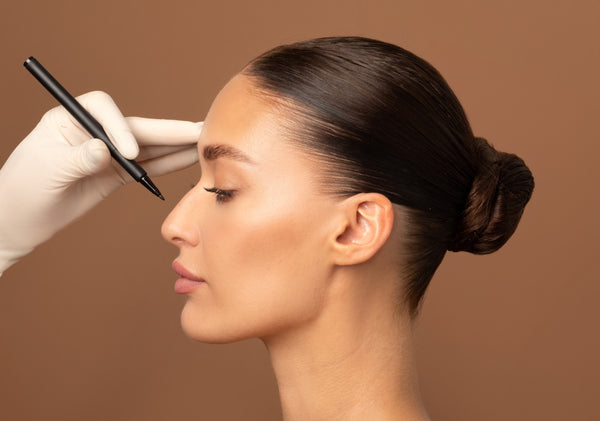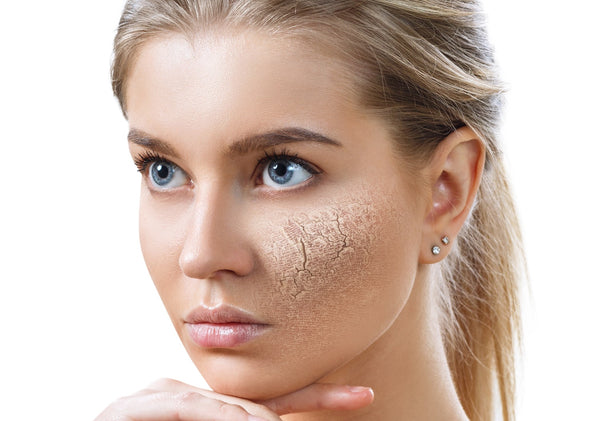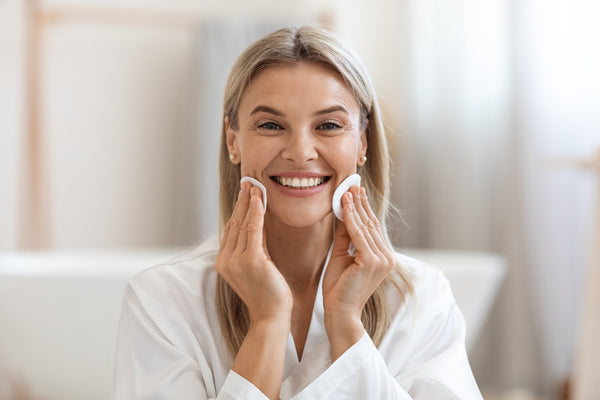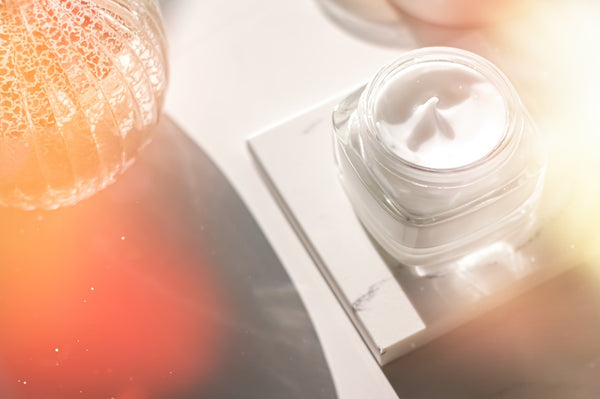Postpartum Skincare Routine for a Glowing Complexion

Postpartum skin changes like acne, hyperpigmentation, textural differences, or even loss of skin firmness can sometimes feel overwhelming - especially when it's the first time you're experiencing any of them. In this article, we'll guide you on how to cultivate an effective postpartum skincare routine for a revitalized, plumped, and more vibrant glowing complexion.
But first, let's start with understanding the basics. As a woman, it's important to be kind to yourself and your body in every stage of your life - more specifically in the postpartum period. Our bodies adjust and react differently and it's a beautiful thing. Once we give birth, our skin can sometimes go from glowing, clear, and luminous to either excessively oily or dry, dehydrated and dull, or irritated and acne-prone. But the good news is that whether you are expecting, planning, or just gave birth, we're here to help you discover the best skincare routine for post-pregnancy skin changes.
What Causes Postpartum Skin Issues?
The number one cause of most postpartum skin issues is a rapid decline or a fluctuation in hormones. The main hormones produced during pregnancy are estrogen and progesterone. The amount of estrogen produced may be surprising to a lot of women. In fact, a woman will create more estrogen during one pregnancy than throughout her entire life.
Sometimes after giving birth, these hormones can begin to decline rapidly. As a result, it's common to experience postpartum changes that can also affect our appearance in skin, hair, fluctuating weight, and confidence. If you are currently experiencing any of these changes after giving birth you are not alone. Keep reading as you're a few steps closer to unveiling a glowing complexion - courtesy of our most effective postpartum skincare routine.
Top Postpartum Skin Issues
 It's important to know which active ingredients to avoid while pregnant and breastfeeding like Retin-A, or Retinol to name a few but we’ll dive into more ingredients and habits to avoid some common post-pregnancy skin concerns and explain how you can deal with them safely and effectively:
It's important to know which active ingredients to avoid while pregnant and breastfeeding like Retin-A, or Retinol to name a few but we’ll dive into more ingredients and habits to avoid some common post-pregnancy skin concerns and explain how you can deal with them safely and effectively:
Acne
One of the biggest pregnancy skin changes a woman can experience is acne. As sebaceous glands go into overdrive you may suddenly start getting pimples on your face and body, even if you’ve never had acne before.
Additionally, if you had acne previously it can actually get worse after pregnancy. You may see an increase in the severity and frequency of your breakouts. No area is off limits, either, as the acne can appear on your chest, back and arms.
How to deal with postpartum acne: The likely underlying cause of your acne is excess oils and debris in the pores. For this reason cleansing your face morning and night with a gentle cleanser is very important and can help minimize breakouts. MD Glam's Deep Pore Foaming Cleanser was formulated with pore-purifying ingredients and rich moisturizing agents designed to leave your skin beautifully balanced, clean, and clear.
We also recommend doing weekly treatments to address acne breakouts. One of our favorites for women who are pregnant is a clay mask to help draw out impurities, detoxify the pores and help balance oily skin or a gentle yet effective exfoliate scrub. Our Exfoliating Enzyme Scrub is unlike any other scrub you've used before. When Dr. Cat formulated it, she women with sensitive and breakout-prone skin in mind. Most exfoliating scrubs are the contributing factor of acne, breakouts, and overall skin sensitivity. Crafted with extra-fine particles to ensure a gentle, complexion polishing treatment - safe for pregnant and postpartum skin.
Skin Becoming Oily or Dry
 It’s possible that your usual skin type may drastically change and become the opposite. If you’re normally dry, it can get oily, and visa versa. Your usual skincare products may no longer be suitable as they can sometime worsen the condition.
It’s possible that your usual skin type may drastically change and become the opposite. If you’re normally dry, it can get oily, and visa versa. Your usual skincare products may no longer be suitable as they can sometime worsen the condition.
How to deal with postpartum skin reversal: Invest in a gentle cleanser, and moisturizer like MD Glam's DMAE Antioxidant Day Moisturizer for your new and temporary skin type. We recommend keeping your new skincare purchases to a minimum as your skin will adjust accordingly to the products you use consistently in your postpartum stage. Your complexion may revert to normal after several months or after you stop breastfeeding, leaving you with products you may no longer use.
Skin Texture changes
Dry areas, rough patches and changes in pore size - these fall under the category of texture changes. Your skin may feel different to the touch, or may lack the softness you had before getting pregnant. In most cases, this is nothing more than a buildup of dead skin cells that need to be exfoliated and there are several solutions to this issue.
How to deal with postpartum skin texture changes: A good exfoliant should help alleviate most skin texture concerns. If you don’t have any acne, then a facial scrub can be used to slough away rough skin and smooth texture. If acne is present, use an AHA/BHA serum to dissolve dead skin cells.
Use a high quality moisturizer, preferably with hyaluronic acid, to keep the skin hydrated especially at night. Doing so will help minimize the appearance of any texture changes and give your skin vital moisture.
Hyperpigmentation
The most common pigmentation issue affecting women postpartum is melasma. What causes postpartum skin issues like melasma? There seems to be a hormonal connection with this type of condition, which is why it’s also referred to as a “pregnancy mask.”
Melasma presents as a collection of pigmented lesions (dark patches) on the face, usually found on the forehead and cheeks. It can appear on other areas of the body as well. Sun exposure can make melasma worse and it rarely fades on its own without some form of intervention.
How to deal with postpartum melasma: For your babies safety, we recommend waiting until you're not breastfeeding until you have you can properly treat melasma. That’s because most ingredients and medical treatments are not recommended while you’re breastfeeding.
To keep your melasma from getting worse the best thing you can do is avoid UV exposure. When you’re finally ready to address it, your options include chemical peels, IPL treatments and home care products that contain vitamin C and SPF like our Sunshout Sunscreen SPF - 50 for brighten skin and fade hyperpigmentation. Although, our SPF is not formulated specifically for melasma, we have had many customers with melasma who found that their condition has significantly approved just by wearing it consistently - regardless of the weather.
Skin Laxity and Stretch Marks
Most women will experience loose skin and stretch marks on their tummy after giving birth. Sometimes the skin contracts back to its natural shape. What’s more, if you gained or lost weight during your pregnancy, you may have skin laxity and stretch marks in other areas, such as the breasts, arms, thighs and hips.
How to deal with postpartum skin laxity and stretch marks: Treating these top postpartum skin issues is not so simple. At this point permanent changes occurred to your collagen fibers. Oils and creams can help a little; however, only medical treatments can restore your skin back to pre-baby condition.
Fortunately, many options exist to address these concerns. Stretch marks, when they’re new, respond really well to microneedling or fractional laser treatments. Mild-to-medium skin laxity can be treated with skin-tightening devices such as ThermiSmooth and radiofrequency. Keep in mind that if you have extremely loose skin and excess fat, a tummy tuck may be the best option.
What Skincare to Use During Pregnancy?
Use gentle skincare products that don’t contain harsh chemicals. We believe that you can absorb many ingredients through your skin, potentially passing them on through breast milk. So sticking to more simplified products that don't contain harsh chemicals as part of your postpartum skincare routine is recommended.
What Skincare Products Should I Avoid While Breastfeeding?
You should most definitely avoid well-known, postpartum-contraindicated topical ingredients such as tretinoin, as well as most active agents. Currently, there’s not enough safety data on the effects of these products on nursing mothers and babies, so it’s best to stay away from them. For a full list of products to avoid we recommend consulting with you OB/GYN.














